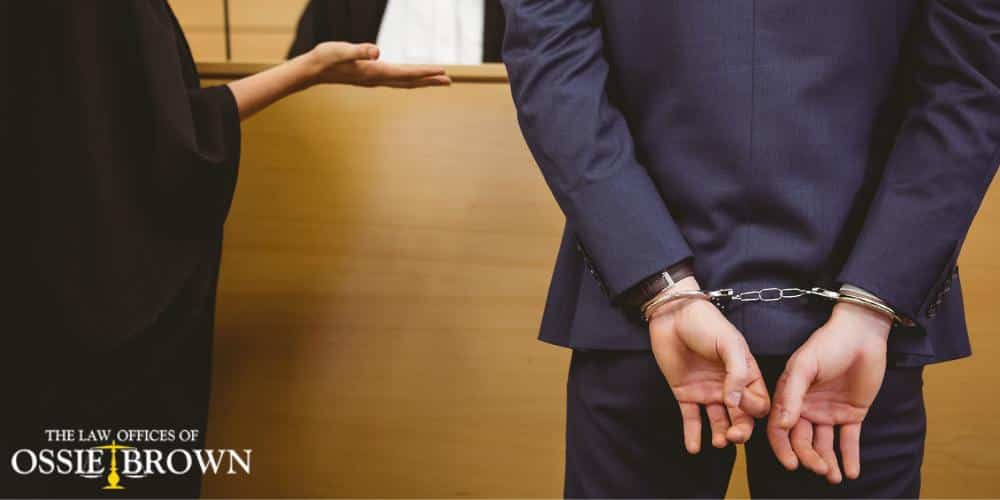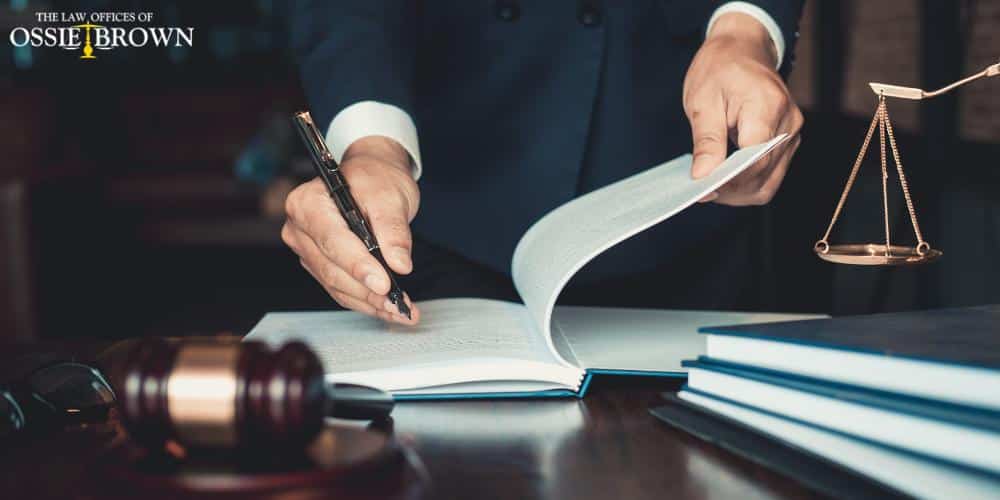As you have probably heard before, an individual suspected of committing a crime is considered “innocent until proven guilty.” In America, a person is not presumed to be guilty until they either admit guilt or are found guilty by a jury of their peers. Criminal cases are held to a high standard of proof, meaning the jury must evaluate the case with a very high level of scrutiny. The evidence presented must prove to the jury that the defendant is guilty “beyond a reasonable doubt.”
But what is reasonable doubt? Are all cases held to the same standards? In this blog, we’ll explore the different standards of proof and the meaning and purpose of establishing different standards of proof. Baton Rouge criminal defense attorneys at The Law Offices of Ossie Brown have been defending the Louisianans since 1984 and are experienced in trying a wide range of criminal cases. If you have been charged with a crime, call 225-343-1111 to schedule a free consultation.
Beyond Reasonable Doubt Meaning
What is Reasonable Doubt?
To have reasonable doubt about something is to have a fair and justified amount of skepticism toward that thing. In the context of criminal proceedings, reasonable doubt includes any common sense scrutiny a juror could have toward the evidence presented by the prosecution. To put it simply, it’s any doubt that is based on reason.
The prosecuting attorney’s goal is to convict the defendant, or the person accused of a crime, and have them declared guilty. But in order for that to happen, they must prove to the jury that the defendant committed the crime, leaving the jury with no reasonable doubts that the prosecution presented the truth. If there is no reasonable doubt in a case, the jury must declare the defendant guilty.
Often, reasonable doubt is used in the phrase “beyond a reasonable doubt,” which refers to the standard of proof that criminal prosecutors must meet for a jury to convict the defendant. The “standard of proof” is the level to which prosecuting attorneys must prove guilt. We’ll explore the different standards of proof in more depth later.
Let’s go through an example of a potential criminal case to illustrate what constitutes reasonable doubt. You are the defendant and have been accused of shoplifting. If the prosecuting attorney cannot provide proof for the different elements of the theft crime, like your presence in the store at the time of the shoplifting incident, or if a seasoned Baton Rouge shoplifting attorney provides the jury with alternate situations for what actually occurred, then a jury would have reasonable doubt that you committed the crime. If there is reasonable doubt present, the jury should declare the defendant innocent.
What is Unreasonable Doubt?
While reasonable doubt is doubt based on reason, the term “unreasonable doubt” refers to substantial doubt or skepticism based on nonexistent or insufficient evidence. This means that jurors should look at the evidence presented, not the evidence the defense could be lacking or evidence the prosecution did not present. Jurors should not take any unreasonable doubts into consideration when declaring a verdict. The burden of proof is on the prosecution, so if the prosecution cannot provide sufficient or legitimate evidence, the defendant should be declared innocent.

Belief vs. Certainty in Criminal Cases
When evaluating whether or not a defendant is guilty, jurors should rely on certainty rather than belief. Belief is subjective and can vary from person to person. A juror can believe someone is a criminal without using evidence to support that belief. Certainty, however, is much more objective and requires evidence and proof to be achieved. The prosecution’s goal is to make the jury certain that a person charged with a crime is guilty of that crime. It’s difficult to make a decision with absolute certainty, so the standard of proof is “beyond a reasonable doubt” instead of “without any doubt.” Still, jurors should rely more on certainty than beliefs in order to be as objective as possible in their decision.
Presumption of Innocence
As we previously mentioned, anyone accused of a crime is considered innocent until proven guilty. This is the “presumption of innocence,” meaning no one is considered guilty of committing a crime until they are proven to be guilty beyond a reasonable doubt. It is the prosecution’s burden to prove guilt, not the defense’s burden to prove innocence. While every person is presumed innocent until proven guilty, that doesn’t necessarily mean that they are truly innocent. If the prosecution is able to prove that the defendant committed a crime, then they are no longer considered innocent.
How to Prove Reasonable Doubt
As we’ve previously discussed, the prosecution must provide enough evidence to prove guilt. To declare the person guilty, the jury must have enough evidence to do so. The prosecution will oftentimes present physical evidence and witness testimonies to help prove the defendant is guilty.
An experienced criminal defense attorney can help those accused of crimes stand trial. Lawyers who are experienced in criminal law, like those at The Law Offices of Ossie Brown, can help you navigate the American legal system and stand trial.
What Are the Three Burdens of Proof?
For a defendant to be found guilty, the government is burdened with the task of proving the defendant’s guilt, which is referred to as the “burden of proof.” In criminal cases, there are three different burdens of proof, which are:
- Beyond a reasonable doubt;
- Probable cause; and
- Reasonable suspicion.
In a criminal trial, the prosecution’s job is to prove the defendant’s guilt beyond a reasonable doubt to secure a conviction. Prosecuting attorneys are members of law enforcement and are challenged with gathering all the evidence they can to convict individuals of crimes. Prosecutors are not the only people with a burden of proof that they must meet: other members of law enforcement are also required to meet certain burdens, including “probable cause” and “reasonable suspicion.”
For a police officer to arrest someone, they must have “probable cause,” meaning they have reasonable grounds to arrest them. They cannot arrest someone simply on the suspicion that they committed a crime. Probable cause also applies to search warrants. If the arresting officer does not have probable cause to obtain a search warrant, a trial judge cannot grant the police a search warrant.
A police officer may need probable cause in order to arrest someone, but they do not need probable cause to stop someone in public; they only need “reasonable suspicion.” Reasonable suspicion is established when an officer has reason to believe someone is committing, has committed, or is about to commit a crime. The officer may ask the person for information, including their name and address, as well as an explanation of their actions or intentions.

Other Standards of Proof in Criminal Cases
One of the essential elements of a case is the “standard of proof” required. The standard of proof is the level to which a side has to prove fault or guilt, and it varies from case to case. Different standards of proof include:
- Preponderance of evidence;
- Clear and convincing evidence; and
- Beyond a reasonable doubt.
Preponderance of Evidence
“Preponderance of evidence” is the standard of proof for many civil cases. With this standard of proof, the jury decides that the facts presented by one side of the trial are more likely to be true than the facts presented by the other side. The jury only has to be 51% sure that the narrative presented by the defense or prosecution is true in order to rule in favor of that side. This is a much lower standard of proof than what is required to prove guilt beyond “a reasonable doubt.”
Clear and Convincing Evidence
The “clear and convincing evidence” standard of proof involves more credible evidence and proof than cases that only require preponderance of evidence. To reach this standard of proof, the judge and jurors must believe that there is a high probability that one side of the trial is in the right. This standard of proof still requires less certainty than proving something “beyond a reasonable doubt,” but it requires a greater amount of convincing evidence in order to reach than it does to reach the preponderance of evidence standard. Clear and convincing evidence is usually required for civil cases that deal with important issues like a person’s rights.
Guilt Beyond a Reasonable Doubt
The last standard of proof is “beyond a reasonable doubt.” To prove the defendant’s guilt beyond a reasonable doubt and secure a criminal conviction, the prosecution must provide clear and convincing evidence and information for the jury to declare the defendant guilty.
Different cases are held to different standards because of the risk associated with different cases. Criminal cases are held to a higher standard because they almost always have higher stakes than civil cases. A case in which a person might lose their freedom has a higher risk than that of a case in which a person may have to pay damages and fees. The legal standard of proof present in criminal cases prevents jurors from declaring an individual guilty based on unjustifiable means.

Call Baton Rouge Criminal Defense Lawyers at the Law Offices of Ossie Brown Today
If you are facing criminal charges, it’s important to hire an experienced criminal defense attorney to help you develop a strong defense strategy. The legal team at the Law Offices of Ossie Brown have been serving the residents of Baton Rouge for decades and have the experience necessary to defend you and your rights. Call 225-343-1111 today to speak to one of our team members or email us at info@ossiebrown.com so that we can help try your case.

